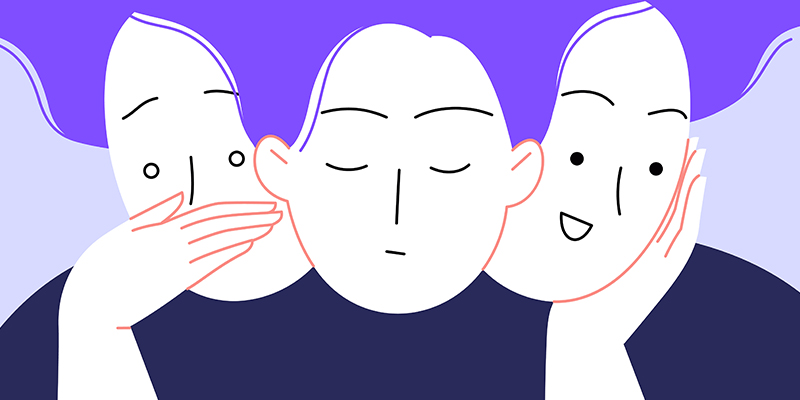
Living with bipolar disorder isn’t easy. Just ask anyone who struggles with the ups and down of this serious mental health condition. What many of these sufferers don’t realize is that their everyday habits could be making their bipolar disorder symptoms worse.
In this blog, you’ll discover the 5 worst habits for bipolar disorder as well as healthier habits that can help people with the condition achieve better emotional balance.
Living with bipolar disorder isn’t easy. What many of these sufferers don’t realize is that their everyday habits could be making their bipolar disorder symptoms worse.WHAT IS BIPOLAR DISORDER?
Bipolar disorder, also known as bipolar spectrum disorder, is a brain-based mental health disorder that is characterized by extreme changes in mood and energy levels. The highs and lows associated with bipolar disorder typically cycle from manic episodes to depressive episodes.
- Manic episodes: During manic episodes people with bipolar disorder tend to feel highly energized, creative, and euphoric. They may feel invincible, which leads them to engage in risky activities or inappropriate social behaviors.
- Depressive episodes: These periods are associated with a significant drop in mood and energy levels. People can feel sad, lethargic, and hopeless.
Although many people with bipolar disorder experience these cyclical energy and mood swings, some people don’t. That’s because bipolar disorder is not a singular condition. In fact, there are multiple types of bipolar disorder, including:
- Bipolar I
- Bipolar II
- Cyclothymic disorder
- Bipolar disorder not otherwise specified (NOS)
BIPOLAR DISORDER AND THE BRAIN
Functional brain imaging at Amen Clinics using SPECT scans reveals that bipolar disorder is associated with abnormal patterns of brain activity. SPECT scans of people with the condition often show overactivity in certain brain regions, such as the limbic system.
The limbic system is involved in:
- Setting the emotional tone of the mind
- Modulating motivation, fear, and memory
- Processing sensory information
SPECT scans can also help identify brain activity patterns associated with other mental health disorders. This is important because having bipolar disorder increases the risk of having other conditions.
For example, approximately 62% of individuals with bipolar disorder also have ADD/ADHD, according to research. Other mental health problems commonly seen in people with bipolar disorder include anxiety disorders and substance use disorders.
Diagnosing these co-existing conditions can be beneficial because getting treatment for all underlying issues is the key to getting more emotional balance.
5 THINGS THAT MAKE BIPOLAR DISORDER WORSE
Many life events and habits can exacerbate bipolar symptoms. Here are 5 things not to do if you have bipolar disorder.
- Don’t skimp on sleep: In those with bipolar disorder, inadequate or disrupted sleep can have negative impacts on mood stability. Based on a 2018 study, not getting enough sleep is associated with heightened severity of depressive and manic episodes. In this study, the worsened bipolar symptoms were more evident in women compared with men.
- Don’t ignore relationship problems: It can be challenging for people with bipolar disorder to have stable relationships. Bipolar symptoms, including risky sexual behavior, irritability, and moodiness, can lead to rocky relationships.
Experiencing arguments breakups, or a divorce is also associated with heightened stress, which can exacerbate bipolar symptoms. Research indicates that the impact of negative social experiences on those with bipolar disorder can be so significant that it may trigger suicidal thoughts and behaviors.
- Don’t ignore the effects of medications: Some medications can increase bipolar symptoms. Scientific findings, for example, reveal that as many as one-third of people with bipolar disorder are susceptible to manic episodes that are triggered by antidepressants.
Other types of medications that may trigger manic symptoms include prescription stimulants commonly used in the treatment of ADD/ADHD. Medications for the treatment of hypothyroidism, as well as appetite suppressants and corticosteroids, may also lead to manic symptoms.
- Don’t use alcohol or drugs: Drug and alcohol make bipolar disorder worse. For example, it can extend the duration of manic or depressive episodes, according to a 2015 study. Based on the findings in this research, using cannabis significantly exacerbates manic episodes. In addition, substances and alcohol alter brain function, which can also worsen bipolar disorder.
- Don’t drink caffeinated beverages: Consuming caffeine can lead to manic episodes in those with the condition, according to a 2021 study. This study points to the stimulating effects of caffeine as the most likely problem. Stimulants can enhance moods, disrupt sleep, and alter the metabolization of medicines used to treat bipolar disorder.
5 BRAIN-HEALTHY HABITS TO IMPROVE BIPOLAR SYMPTOMS
Knowing what NOT to do is only one of the steps in managing bipolar symptoms. Understanding the lifestyle habits that help balance the brain is key to achieving more stable moods and energy levels. Here are 5 simple ways to boost your brain and achieve greater balance.
- Make sleep a priority. Focus on getting 7-8 hours of sleep each night.
- Work on your relationships. If your bipolar symptoms cause trouble in your relationships, consider couples counseling or marital therapy. When your significant other understands that some of your behaviors are bipolar symptoms, they are less likely to take it personally.
- Know how medications affect you. Make sure to speak with your healthcare provider about all medications and supplements you take. Find out if any of them may impact your symptoms.
- Avoid drugs and alcohol. One of the best ways to avoid worsening bipolar disorder is to give up alcohol and drug use.
- Eliminate caffeine. Avoiding caffeine can be a powerful strategy to have more balance in your life.
Bipolar disorder and other mental health issues can’t wait. At Amen Clinics, we’re here for you. We offer in-clinic brain scanning and appointments, as well as mental telehealth, clinical evaluations, and therapy for adults, teens, children, and couples. Find out more by speaking to a specialist today at 888-288-9834 or visit our contact page here.





No Comments »
No comments yet.
RSS feed for comments on this post.
Leave a comment